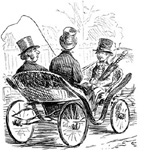
Symposium on Roman Catholicism & “American Exceptionalism”
A DE-FACTO SCHISM IN THE U.S.?
The New Oxford Review addressed the following queries to a group of distinguished Christian thinkers:
(1) The cases of Archbishop Raymond Hunthausen and Fr. Charles Curran have accentuated existing tensions between the Holy See and important elements in the Catholic Church in the U.S., tensions which certain observers feel go to the heart of the question of what it means to be Roman Catholic. Do you think there is a de-facto schism in the U.S., with elements in the American Church having already severed their affective and cognitive ties to the Holy See?
(2) Marxism has been challenged by the thesis of “American exceptionalism,” and Roman Catholic teaching is now being challenged in a similar fashion. The major ostensible issues involve sexual behavior, as well as “free choice” as regards the fate of unborn babies and handicapped infants. To what extent, if at all, should permissive American practices in these areas be regarded as acceptable or normative for or by American Catholics?
(3) Other issues, which cut in an opposite ideological direction, also raise the question of American exceptionalism. To what extent, if at all, should permissive American economic and nuclear policies and practices be regarded as acceptable or normative for or by American Catholics?
(4) Chesterton said, “We do not want, as the newspapers say, a Church that will move with the world. We want a Church that will move the world.” Does this statement define the basic contours of the problem? If not, how would you define them?
Respondents were given the option of answering the queries in a more or less point-by-point fashion, or addressing themselves generally to the issue of the optimal relationship between American society and religion, with particular reference to Catholicism. Since this is a symposium, no attempt was made to achieve a uniformity of response.
You May Also Enjoy
I write these words as the second anniversary of Walker Percy’s death approaches, and as…
The time is ripe to reconsider the trajectory of our nation, and how Catholics fit into it. To that end, we asked thinkers of different stripes four questions.
Kierkegaard’s concept of “the Apostle” influenced Percy’s presentation of character and theological insight in his fiction.

